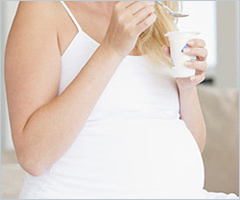Dr. Alicia Stanton, M.D. suggests the following:
Eat small meals every 2-3 hours that consist of a lean protein – chicken, turkey, fish, nuts – and a complex carbohydrate – a vegetable or high-fiber fruit. Consume carbohydrates that rate low on the glycemic index such as vegetables, nuts and seeds, milk and plain yogurt, barley and quinoa, beans and legumes, sourdough bread and fruits from Northern and Mediterranean climates.
When you eat small portions of low-GI foods every three hours or so, it is more effective in keeping blood sugar stable. When your body isn’t in starvation mode, you can make more rational and healthy food choices and keep portions small, rather than overeating on bad choices. Small, frequent meals or snacks of low-GI foods provide a steady stream of energy, reduce stress and result in fuel going to muscles rather than fat, leading to a leaner body.
When you start to eat more nutritious foods, you’ll see food doing what it should do to restore and maintain harmony among hormones:
- Keep blood-sugar levels stable
- Decrease inflammation
- Provide sustained energy
- Help reduce body fat
- Help maintain a healthy weight
- Contribute to overall health and well-being
- Reduce risk for chronic conditions such as diabetes, heart disease, cancer and osteoporosis
- Keep taste buds happy
As a pescatarian before conception, my diet changed a bit within my first trimester. Not only did I have to research what fish was best to eat, but then there were times I couldn't even stand the smell of any type of seafood. I began to crave more red meat and turkey, so incorporated both back into my diet. Typically, if I did a fish and meat weekly, I wouldn't crave it again until the following week. I made sure I got protein from other sources as well: milk, cheese, yogurt, beans, eggs. I researched some different protein powders, and although each individual should check with their midwife/doctor before taking any sort of supplement, I found Jay Rob's Whey/Egg protein to work well for me. The cows are not treated with growth hormones, and it contains no artificial sweeteners, colors, or flavors.
I also will pick up pre-made protien shakes for when I am really on the go, my favorite have been Orgain shakes (found at Buy for Less or Whole Foods). They were referred to me by my friend who is a nurse, and also pregnant, and I also had my naturopathic doctor review the ingredients. They have a light taste, and just gives an extra boost of protein.
SUPER foods!
Focusing on what I can eat vs. what I can't has always helped me stay focused on my diet. After pregnancy, I began to do a bit more research into Superfoods--these are foods that have reported health and medical benefits such as:
Here's a list of some of my favorites that I gathered from various resources and sites, and my goal has been to add at least one superfood into each meal:
Sweet potatoes
Blueberries
Spinach / kale
Buckwheat
Seaweed
Flaxseed
Dark chocolate
Green tea
Almonds
Walnuts
Salmon
Yogurt
Spelt (nuts)
Broccoli
Cauliflower
Cabbage
Avocados
Beans
Oats
Oranges
Turkey
SHAKE IT UP!
A huge nutritional tool for me throughout my pregnancy has been smoothies or shakes! I got a blender for a wedding gift, and have put it to very good use ever since. For me, cool foods have tasted best during pregnancy, and I have often had to find a way to add more food/nutrition into my routine. As I've mentioned in other blog posts, that can be difficult to constantly prepare and think ahead--so shakes have been super helpful. I will add them onto whatever I may be having for breakfast or lunch, and also use them as one of my "in between" snacks to help give keep my blood sugar level. Below is a list of foods I include in my smoothies, always add the ice, it can be fun to mix and match--you never know what might be a favorite!
granola
greek yogurt
organic fruit yogurt
almond milk
non-fat organic milk
kefir
flaxseed oil
blueberries
bananas
strawberries
mandarin oranges
pineapple
peach slices
protein powder
spinach leaves (you can't taste)
kale
Odwalla or Naked brands Superfood juices
Emergen-C (consult doctor/midwife for pregnancy)
Dark chocolate chips
natural peanut butter
oatmeal
GO PRObiotics
With permission from my midwife, I take a probiotic capsule daily with my prenatal vitamin, and I can see a vast improvement with my digestive system. Probiotics are good bacteria that can be found in the body, and ingestion has many health benefits such as helping the digestive system and strengthening the immune system. Probiotics can be found in foods such as kefir and yogurt, and then also taken in capsules (which I do all). For more information, here is a Baby Zone article that can explain more:
There have been many studies around poor nutrition being linked to pre-eclampsia, a complication in pregnancy characterized by high blood pressure and swelling along with other symptoms. It can be mild or severe, and you definitely want to identify the condition if it occurs. Most studies are still inconclusive, as explained in The Journal of Nutrition:
However, I always think a good diet and nutrition can only benefit you and your baby. Here is an article of what many believe can help prevent this pre-eclampsia and other conditions:



No comments:
Post a Comment